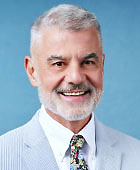In Confronting Addiction, Older Adults Often Fall Through the Cracks

The addiction prevention efforts that APA has undertaken to date as part of my presidential initiative on addiction have largely focused on adolescents in middle school or high school, as this is often the age when experimentation with substances begins to occur. There’s logic to this, of course, as early intervention often has the best outcomes for people with substance use disorders (SUDs) and other mental disorders. However, as the American population ages, we cannot afford to compound an already devastating substance use crisis by overlooking the needs of older Americans.
Projections from the U.S. Census Bureau estimate that by 2034, adults aged 65 or older will outnumber children for the first time in American history. The Census Bureau also projects that by 2060 nearly 1 in 4 Americans will be an older adult. In the coming years, psychiatrists will treat more and more older adults with SUDs. The 2021 National Survey on Drug Use and Health from the Substance Abuse and Mental Health Services Administration recorded a stark increase in SUDs among older adults, with over 4 million adults aged 65 and older dealing with an SUD in 2021, a fourfold increase from just under 1 million in 2018.
These numbers portend more pressure being put onto an already overstressed addiction treatment system, and yet we still don’t truly understand the full scope of the problem. Older adults remain an undersampled and undertreated population when it comes to SUDs. Recognizing the signs of SUD in an elderly person can be difficult, primarily due to psychiatric and other medical comorbidities, which often present with symptoms that overlap with substance use symptomatology. Older adults are also prescribed a greater number of medications than younger people, increasing the risk for prescription misuse. A further complication is the lack of a validated universal screening tool for SUDs in older adults.
As leaders in mental health and SUD treatment, psychiatrists work to improve the recognition of SUDs in the older adults in our care. Implementing universal screening protocols such as Screening, Brief Intervention, and Referral to Treatment (SBIRT) for alcohol use is one step in the right direction. Addressing regulatory and policy barriers that prevent patients from accessing the full spectrum of treatment services they need is another.
Most older adults are covered under Medicare, but since it is not subject to the Mental Health Parity and Addiction Equity Act (MHPAEA), it does not cover all SUD treatment settings and provider types. APA and our member psychiatrists continue to advocate for access to all the treatment services that older patients need. Increasing Medicare coverage to include SUD treatment could even lead to more programs specifically tailored to that age group.
Expanding Medicare to cover these services and working to improve our screening and treatment protocols carry a cost, which would be minimal compared with the cost of failing to address the needs of a rapidly growing segment of our population.
We owe it to our patients to ensure that they have access to high-quality care for mental disorders, including SUDs, throughout the entirety of their lives. ■



